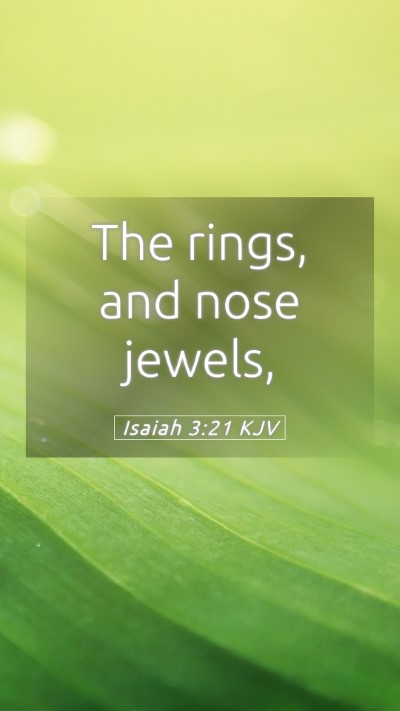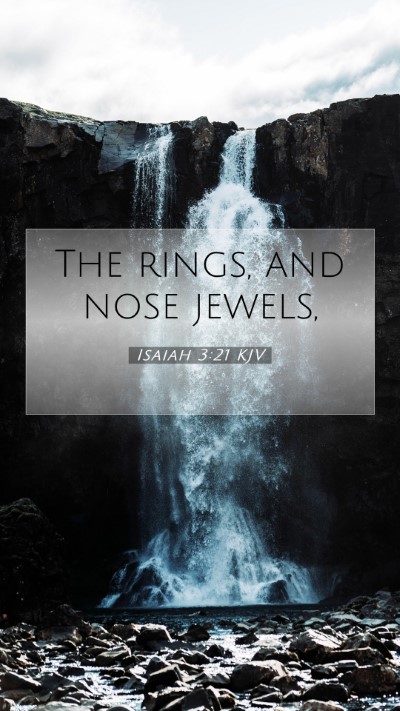Understanding Isaiah 3:21
Isaiah 3:21 states: "The rings and nose jewels," highlighting a significant cultural critique about the external adornments that were prevalent among the people of Judah.
Bible Verse Meanings
This verse reflects God’s disapproval of the excessive adornment and vanity of the daughters of Zion (Jerusalem). The focus here is on the superficiality and materialism that distract from genuine faith and character.
Bible Verse Interpretations
According to Matthew Henry, this verse is part of a larger context where Isaiah describes the judgment of God on Judah, particularly targeting pride and vanity. The focus on rings and nose jewels serves as an indictment of moral and spiritual decline.
Albert Barnes adds that such adornments were not inherently sinful but become problematic when they signify a heart that prioritizes outward appearances over spiritual holiness. The emphasis is on inner beauty and character as opposed to outward decoration.
Adam Clarke further explains that this critique of adornment denotes a greater spiritual principle. The people of Judah were displaying their wealth and beauty publicly while neglecting their covenant relationship with God.
Key Insights from Commentaries
- Focus on Inner vs. Outer: The emphasis is on the importance of inner beauty over outer appearances, representing spiritual integrity.
- Judgment on Vanity: The adornments symbolize a culture engrossed in pride and superficiality, which draws God's judgment.
- Historical Context: During Isaiah's time, such displays of wealth indicated social status and divine favor, yet they distracted from true piety.
Scripture Analysis
In the broader context of Isaiah 3, this verse situates itself within a poignant warning about the consequences of societal corruption, particularly through materialism and neglect of divine values.
Historical Context of Bible Verses
Isaiah prophesied during a tumultuous period for the Kingdom of Judah, where external foes threatened and internal decay was rampant. His warnings about vanity and adornment reflect a deeper theological truth about God’s desire for authentic worship and relationship over ritualistic displays.
Bible Study Insights
This verse provides a fertile ground for Bible study groups, particularly in discussions about how to apply biblical principles of modesty and humility to contemporary life. The challenge remains in balancing cultural expressions of identity with scriptural exhortations for character.
Application of Isaiah 3:21
For modern readers, Isaiah 3:21 serves as a critical reminder to assess personal values and priorities. It's an invitation to reflect on quotidian choices about adornment, success, and societal norms in light of faith.
Related Bible Cross References
- 1 Peter 3:3-4: "Your beauty should not come from outward adornment..." emphasizes inner beauty.
- Matthew 23:25-26: Jesus criticized the Pharisees for focusing on outward appearances instead of inner righteousness.
- James 4:6: "...God opposes the proud but shows favor to the humble," linking humility to divine favor.
Conclusion
The exploration of Isaiah 3:21 through biblical exegesis encourages a deeper understanding of Scripture and the importance of aligning our lives with God’s desires. Whether you engage in personal study or in Bible study groups, this verse reminds us to prioritize genuine faith over superficiality.
Encouragement for Further Bible Study
Consider diving deeper into how the themes of this verse resonate with others throughout Scripture. Utilize Bible study tools and guides to explore the significance of prophetic literature and its applicability in personal life.


